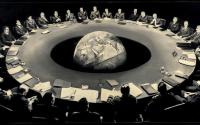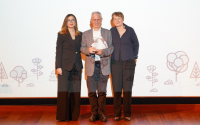24 May 2006
The House yesterday approved a bill to ban U.S. assistance to the Palestinian Authority. The Palestinian Anti-Terrorism Act would make it difficult for nongovernmental organizations, except those providing healthcare, to receive U.S. funds. PLO Ambassador Afif Safieh, the Heritage Foundation’s Ariel Cohen and Brit Tzedek V’Shalom’s Rob Levy debate the issue. [includes rush transcript] The House yesterday approved a bill to ban U.S. assistance to the Palestinian Authority. The Palestinian Anti-Terrorism Act was passed by a vote of 361 to 37. The measure would make it difficult for nongovernmental organizations, except those providing healthcare, to receive U.S. funds. The bill also denies U.S. visas to members of the Palestinian Authority, prohibits official U.S. contact with Palestinian officials, and cuts off U.S. funding of United Nations agencies that directly assist the Palestinian Authority. The White House, which has already cut off direct aid to the Hamas-led Palestinian government, said the bill went too far. A less restrictive measure is being considered in the Senate. The US-led international boycott of aid to the Palestinian Authority has plunged the Occupied Territories into a financial and humanitarian crisis.
Afif Safieh, PLO ambassador to the United States. Rob Levy, Washington representative of the US Jewish organization Brit Tzedek V’Shalom, one of three Jewish organizations active in lobbying against the legislation. Dr. Ariel Cohen, Senior research fellow at the Heritage Foundation.RUSH TRANSCRIPT
AMY GOODMAN: For a debate on the bill, PLO Ambassador Afif Safieh stays with us in Washington. On the phone with us, we're joined by the Ariel Cohen, Senior Research Fellow at the Heritage Foundation, and also in the Washington studio, Rob Levy of the U.S. Jewish organization Brit Tzedek V’Shalom, one of the three Jewish organizations active in lobbying against the bill. We'll go first to our telephone guest, Dr. Ariel Cohen of the Heritage Foundation. Why did you support it?
DR. ARIEL COHEN: Good morning. It's a pleasure to be here. I think that the bill calls a spade a shovel. The Palestinian Authority, the P.A., is today controlled by a terrorist entity, an entity that is on the U.S. State Department terrorism watch list, the entity that is responsible for deaths of numerous Americans, as well as numerous civilian Israelis, women, children, old people, and the latest victim just died in a Tel Aviv hospital. It was a kid from Florida, a 16-year-old who was blasted away by a bomb in a falafel stand in Tel Aviv, and the Hamas-led Palestinian Authority, just like the PLO-led Palestinian Authority before that, is doing precious little, if at all, to combat terrorism.
And I think that any support, any money, any assistance given to a terrorist control entity is just like giving support to a Taliban-led government in Afghanistan. We have soldiers on the ground in Afghanistan. We brought down the Taliban. This is a part of a global Jihadi wave that is attacking the West, attacking Europe, Israel, the United States, and this has to be stopped. And thank God that the United States Congress, by a majority of over 300 members representing the will of the American people, is doing what it is doing.
AMY GOODMAN: Rob Levy, your response, with one of the Jewish groups that oppose this bill?
ROB LEVY: Thank you for having me. As an American Jewish organization, we were incredibly dismayed by the election of Hamas to the Palestinian Authority, and we recognize that Hamas must renounce terrorism, recognize Israel and agree by all past agreements. However, this legislation goes far beyond those demands and truly undermines the U.S.'s ability to play a constructive role in bringing Israelis and Palestinians back to the negotiating table towards a two-state resolution of the conflict.
It does this in three ways. The first is this bill ties the administration's hands. It removes their ability to have flexibility and discretion to promote negotiations. Secondly, this legislation weakens moderate Palestinians. These are exactly the people that we think we need to be supporting right now. The legislation makes no differentiation between those that are members of Hamas and those that are not members of Hamas, in particular, President Mahmoud Abbas, who, as the President has recognized, is a strong supporter of peace. And thirdly, this legislation severely restricts humanitarian aid going to NGOs that goes towards the Palestinian people, as you mentioned, as a small exemption for health, water and food, but it does not address the building of schools, the building of hospitals, water sanitation plants, creating economic opportunities and building a stable democracy and an independent judiciary.
AMY GOODMAN: Your response, Dr. Ariel Cohen of Heritage?
DR. ARIEL COHEN: Well, I think Abu Mazen, President Mahmoud Abbas, failed on two accounts. Number one, he was given a chance, since he took over after the death of Yasser Arafat, to seriously follow the roadmap, the roadmap on which the quartet -- the United Nations, Russia, the European Union and the United States -- have agreed. And the first thing the Palestinian party was supposed to do was to clean up terrorism infrastructure. Very little was done. There was no stop to incitement to day-to-day propaganda in Palestinian schools, mosques, on television and radio, to stop comparing Jews and Christians to monkeys and pigs, just like the Saudi sponsors of the Palestinian Authority were exposed yesterday in the Washington Post in a report by the Freedom House, authored by the Religious Freedom Center at the Freedom House headed by Nina Shea. The Palestinian Authority is educating the next generation of Jihadis.
Moreover, President Abbas, unfortunately -- and I grant to our listeners and to our guests, I grant to you that he is a more pragmatic man, not necessarily a more moderate man -- more pragmatic man than his predecessor. President Abbas did not do anything to clean up the corruption of the Palestinian Authority. And that, as well as hatred of Israel and Jews, was the root cause of the Hamas victory. Now, the Palestinians represented by the ambassador have a real problem. Their political power, of those who are more nationalist and secular, is threatened by Hamas, but they don't have the support of the people. And the calls to more negotiation with Abu Mazen is like calling for more negotiation with an impotent puppet that has no authority, no popularity, and doesn't do anything to promote the peace process.
AMY GOODMAN: Ambassador Afif Safieh of the Palestine Liberation Organization, ambassador to the U.S.?
AFIF SAFIEH: First of all, I would like to say that the piece of legislation that was voted upon yesterday is extremely unfortunate, and even this administration found it going beyond bold. But I would like to take other aspects that have been insufficiently analyzed the last two, three days.
It's my belief that AIPAC is no more in its golden age. It took AIPAC three months of lobbying to assemble enough sponsorships. For the first time, AIPAC-supported legislation has been defied by so many legislators who either voted against or abstained or were not present at the vote. And I believe AIPAC is wounded as a lobby group, yet Capitol Hill is still unaware of that fact.
Why is AIPAC, in my opinion, having today a diminished status? And today, that vote does not reflect the mood in public opinion, where I perceive a lot of sympathy for the Palestinian society under occupation. I believe four factors. One, AIPAC today, which sponsored this legislation, is challenged in its monopoly of representation of Jewish American preferences. And the fact that we have other voices, three respectable institutions, Jewish American, lobbying against that legislation showed that there is plurality of voices within the American Jewish community and that AIPAC is questioned and challenged in its monopoly of representation.
Fact number two, I believe at least one-third of the political establishment in Israel is becoming increasingly uncomfortable with AIPAC, and this goes back to Rabin, Peres in the early ‘90s, when they noticed that AIPAC increasingly is siding and aligning itself with the maximalist Israeli position, not because it is the most rational, but because it's doable, because legislators on Capitol Hill cave in and succumb too easily to the pressures of that lobby. So, one-third, at least, today of the Israeli political establishment favors the emergence of alternative Jewish American voices.
The third factor, ma'am, I believe the fact that two senior officials of AIPAC are going to be taken to court for espionage case very soon. I believe this shows a beginning of enormous irritation and exasperation, even within this administration, towards the excesses of AIPAC, that junior partner.
Number four, ma'am, I believe around the country today the mood is increasingly allergic to the power of lobbies and interest groups that poisons and distorts and pollutes the political life. And I believe AIPAC is thought of as a major lobby group that has too much power to be in a democratic debate, etc. And I believe the Harvard study, called Harvard study, by a professor from Harvard and another prestigious professor from Chicago, showed that in a way American decision making, in terms of foreign policy in the Middle East, has been in a way monopolized by a lobby that has grown accustomed to using one muscle too many and going one pressure too far.
I remember as a student of American politics that the late Senator Moynihan once said, “An election year is rarely our finest hour.” Unfortunately, you are in an election year. That translates in not being the finest hour. And many legislators caved in too easily to the pressure of AIPAC, but many for the first time did not succumb and even defied the lobby by saying this resolution is not well written, it handicaps American foreign policy, it does not give us the instruments and tools of having a presence and an influence. And even one congresswoman defied AIPAC, because she was attacked and criticized as supporting terrorists, an argument that’s thrown too easily into the political debate. She said, “AIPAC from now on is forbidden of having access to me or to my office, as long as they have not publicly apologized to me.” I believe that’s a new first --
AMY GOODMAN: That was Congressmember McCollum. Yeah, we talked about that yesterday. But we're going to have to leave it there, though we are going to continue on the essay that you referred to on the Harvard University website around the issue of AIPAC and the Israel lobby with Michael Massing. I want to thank you all for being with us: Ambassador Afif Safieh, the Palestinian Liberation Organization ambassador to the United States; Rob Levy, also joining us in Washington, the representative of the U.S. Jewish group Brit Tzedek V’Shalom; and Dr. Ariel Cohen of the Heritage Foundation.






